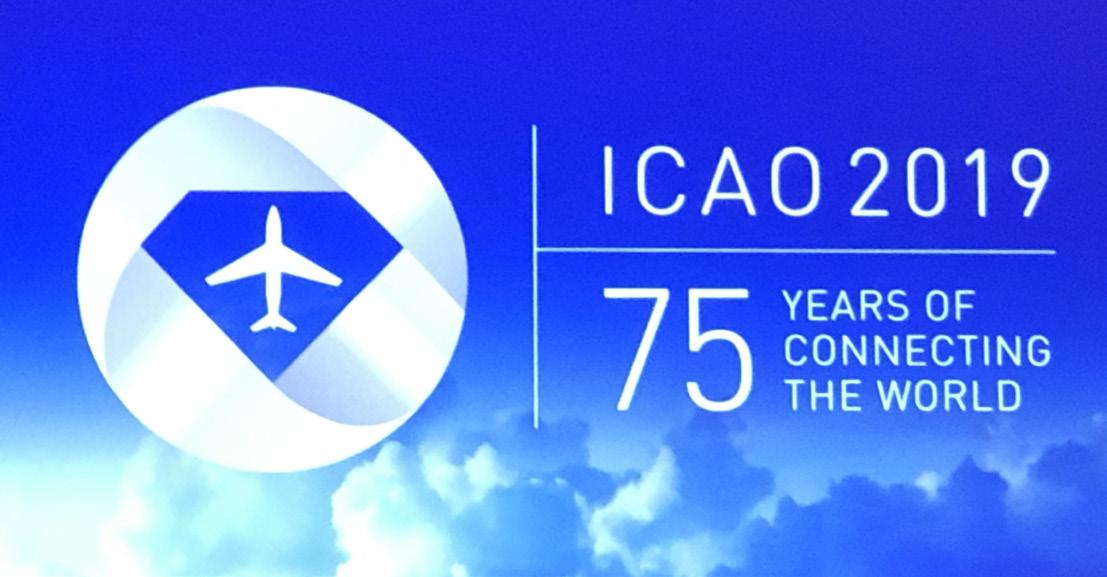
6 minute read
Federation.........................IFATCA at the 40th ICAO Assembly
zby Jean-François Lepage, IFATCA'S iaison Officer to the ICAO Air Navigation Commission IFATCA PARTICIPATION IN GLOBAL MEETING TO SHAPE THE FUTURE OF AVIATION
The 40th ICAO Assembly took place last 24 September to 4 October 2019. It was attended by more than 2400 delegates from around the world, representing 184 of the 193 Member States of ICAO and 55 international organizations, such as ACI, CANSO, IAOPA, IATA, IBAC, ICCAIA, IFALPA, IFATCA, and many more. Interesting to note is the fact that this year, the Assembly coincided with the 75th anniversary of ICAO.
Advertisement
The Assembly is ICAO’s sovereign body; it meets at least once every three years and is convened by the ICAO Council. It is divided into five different commissions: administrative, economic, executive, legal and technical and its primary objective is to determine the direction, budget and work programme of the organization for the next triennium. It is also during the Assembly that Member States are elected to the Council.
IFATCA was represented at the Assembly by a delegation consisting of Duncan Auld (President and CEO), Helena Sjöström (Deputy President), Ignacio Baca (EVP Technical), Peter Van Rooyen (EVP Professional), Jeffrey D. Richards (RPAS Panel Member for IFATCA), Thom Metzger (The Controller Magazine Editor) and Jean-François Lepage (IFATCA Liaison Officer to the ICAO Air Navigation Commission).
During its 40th iteration, the Assembly produced and reviewed more than 640 working papers and information papers. IFATCA co-signed five working papers with other industry organizations (ACI, CANSO, IATA, ICCAIA and IFALPA) on topics of mutual interest, such as commercial space operations integration, the need to address harmful interferences to GNSS signals, the need for standards and guidance to mitigate the risks related to unauthorized UAS operations, the future of frequency spectrum needs in aviation and UAS traffic management.
Among the 640 working papers, the main topics covered were: environment-related issues and the CORSIA initiative (62 papers), security and cybersecurity (55 papers), facilitation (40 papers), ATM-related matters (36 papers), economic issues (31 papers), the “No Country Left Behind” (NCLB) initiative (28 papers), safety management (25 papers), flight operations (24 papers), Remotely-Piloted Aircraft Systems (RPAS) and Unmanned Aerial Vehicles (UAVs) (23 papers) and the ICAO Universal Safety Oversight Audit Programme – Continuous Monitoring Approach (USOAP CMA) (23 papers).
Immediately before the Assembly, the Executive Board gathered for a three-day meeting, also in Montréal. The presence of the entire executive in the city that is home to ICAO was not a coincidence; it was an excellent opportunity for some of the EB members to meet with other international organizations such as IFALPA and ITF, while for others it was the perfect moment to work on logistic and
Photo by Thom Metzger (NATCA/IFATCA)

z Photo: IFATCA Assembly representatives (left to right) were Ignacio Baca (EVP Technical), Duncan Auld (President and CEO), Helena Sjöström (Deputy President), Jean-François Lepage (IFATCA Liaison Officer to the ICAO Air Navigation Commission), and Peter Van Rooyen (EVP Professional).
IFATCA PARTICIPATION IN GLOBAL MEETING
TO SHAPE THE FUTURE OF AVIATION (CONT.)
financial issues at the IFATCA office, along with Tatiana, our Office Manager. Meanwhile, our Liaison Officer to the ICAO ANC, Jean-François, was putting the final touch to the interventions drafted by the group for the Assembly and took care of the necessary coordination and arrangements with some of the key industry partners and States present at the event.
During the two weeks of the Assembly, IFATCA made a number of interventions to support working papers that were presented or to highlight certain aspects not necessarily mentioned in the working papers, but of importance to the Federation:
GLOBAL AIR NAVIGATION PLAN (GANP): ENABLING TIMELY ATM MODERNISATION
As stated in the 6th Edition of the GANP, it is paramount that the role of the human is taken into account when developing technology, equipment and procedures supporting the ATM modernisation. This is the only way we can ensure that the proposed developments yield the expected results, whether it be in terms of capacity, efficiency or safety. IFATCA stressed that the Federation is in favour of an approach where human and technology are complementary; when combined in a suitable manner, together they are able to perform on a much higher level, to which neither the human nor the technology alone is capable. IFATCA recommended that, in line with the GANP, the human is the starting point of any system design.
A NEW STRATEGY FOR THE NEXT GENERATION OF AVIATION PROFESSIONALS (NGAP)
IFATCA has been a strong supporter of the NGAP Programme since its inception and welcomed working papers supporting the initiative. However, the Federation stressed that harmonization of qualifications and licences at the global level can only be achieved with a solid, mandatory licensing scheme for all ICAO States. This is essential to ensure that the same standard level of competence amongst
aviation professionals, especially air traffic controllers is achieved and maintained globally.
To this end, a thorough assessment of Annex 1 Chapter 4 provisions for air traffic controllers is long overdue, and IFATCA welcomed ICAO’s recent Electronic Personnel License TF initiative. We reiterated our commitment to continue to support the work of ICAO regarding qualification and licensing issues.
BUILDING CAPACITY IN ATM
IFATCA is in favour of increased collaboration between stakeholders in order to meet the challenges of the predicted traffic increase in the years to come. However, it was highlighted that while technological and infrastructure improvements are required, they are only a small part of the solution.
On top of the conclusions of the 13th Air Navigation Conference (AN-Conf/13), held last year in Montréal, Assembly Resolutions A38-12 and A39-29 recognize that there is a lack of qualified personnel to support the existing and future air transportation system; which must be addressed by attracting, training and retaining enough qualified personnel. This can only be achieved with adequate salary patterns, social benefits and other incentives. These fundamental elements form the basis of a healthy workforce and thus ensuring an effective development of the aviation sector.

IFATCA agrees that the modernization of the aviation system can only be achieved by building on partnerships, collaboration and cooperation. In the common effort of all stakeholders, the professional associations shall not be forgotten.
CONVERSION AND VALIDATION OF PERSONNEL LICENSE
IFATCA believes that it is essential to ensure the same performance standards are achieved and maintained globally for all aviation professionals, including for air traffic controllers. To achieve this goal, one of the first steps to take is to ensure all States implement an appropriate licensing scheme for air traffic controllers, and to encourage States to implement the competency-based training and assessment provisions detailed in ICAO Doc 9868, Procedures for Air Navigation Services (PANS) Training, Part IV.
It is generally recognized that those States which have implemented licensing schemes for personnel enjoy higher compliance with ICAO Standards and Recommended Practices (SARPs) and therefore it can be seen as a direct safety benefit. In addition, a thorough assessment of Annex 1 Chapter 4 provisions for air traffic controllers is long overdue, and IFATCA welcomed ICAO’s recent Electronic Personnel License Task Force initiative. IFATCA once again reaffirmed its commitment to continue to support the work of ICAO regarding qualification, licensing, and competency initiatives.
THE SAFE AND EFFICIENT INTEGRATION OF UAS INTO AIRSPACE
IFATCA stressed that a strong set of SARPs and PANS provisions will be required in the domain of Unmanned Aerial Systems (UAS). Global harmonization from the onset is desirable because while cross border operations are barely considered at the current state, they will rapidly become a reality. Harmonization from the start is also desirable to avoid future interoperability issues. IFATCA stated its desire to contribute to this effort with its expertise in the domain of air traffic management and airspace. y










